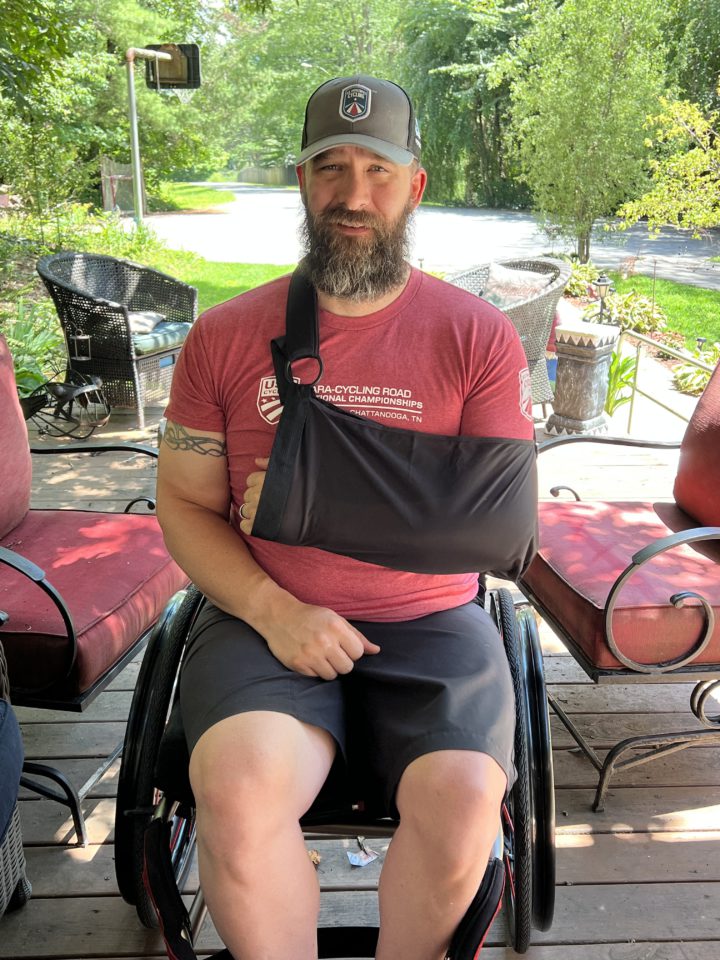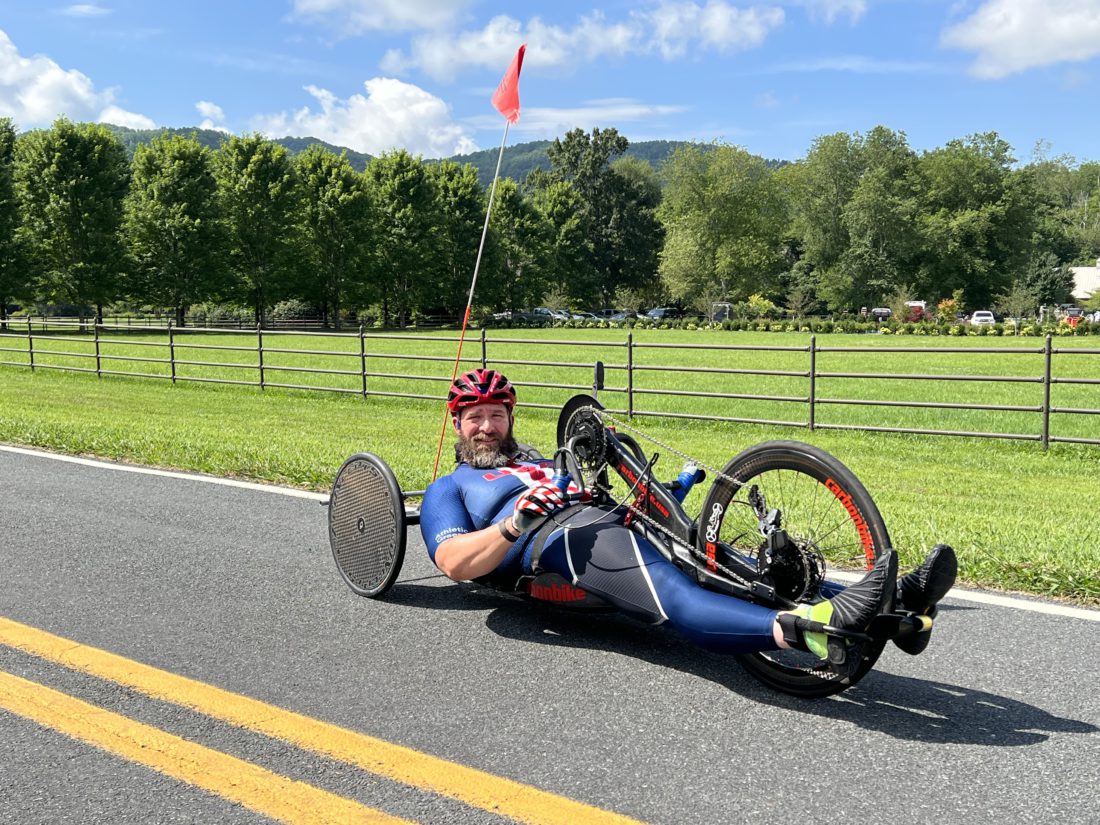U.S. Air Force veteran Dustin Baker is no stranger to adversity. In 2004, while serving overseas, he suffered a spinal injury that paralyzed his legs. Once he adjusted to life in a wheelchair, a fellow veteran reached out to see if he had any interest in handcycling.
“I did one mile and was completely gasping,” Baker recalls. But despite the initial fatigue, he kept at it. “With my lower spinal injury, anything that compresses the spine is an absolute pain for me. But with the bike, there’s no pressure on my spine. I could actually get out and do something. And I got hooked.”
Soon thereafter, he partnered with the Achilles Freedom Team, a subgroup of Achilles International, a nonprofit that supports disabled athletes. The organization invited Baker to compete in marathons.
“They don’t care if you come in first place or if you’re out there for 3 ½ hours. They just want to get veterans together as a support group,” Baker explains. “But once I started getting top 20 finishes, I realized that I could be serious about this.”
Last year, Baker finished third at the U.S. Para-cycling Road National Championships. This July, he traveled to the U.S. Olympic & Paralympic Training Center in Colorado Springs, Colo., in preparation for the 2022 UCI Para-cycling Road World Cup in Canada, which took place on Aug. 4-7.
Tragically, on July 26, Baker was struck and injured by an Asheville driver, while handcycling on Lower Brush Creek Road in Fairview.
“With the handcycle you lay out flat, so the impact [from the collision] was directly on my head and my shoulder,” he says.
Baker endured a concussion, lacerations to his face, three broken ribs, a damaged rotator cuff and road rash across his back and additional lacerations to the chest. Meanwhile, his $35,000 professional handcycle was totaled.
“Being in the mountains of Western North Carolina, I wish that cars and cyclists would have a better relationship,” he says. “You would think that would be natural considering the culture of Asheville. I just ask that drivers please be aware of their surroundings and please be considerate about the cyclists in our community.”
Xpress sat down with Baker to discuss his recent injuries, the challenges of handcycling and how the sport benefits veterans in our area and across the nation.
This interview has been lightly edited and condensed.
First, how are you feeling?
Still really banged up but starting on the road to recovery. I still have multiple weeks before the doctors will allow me to return to work due to the concussion. I can’t get comfortable due to the broken ribs, but I have a wonderful wife who is taking care of me so that I don’t cause further injury. Most of all, I miss being on the bike and being able to get outdoors and get fresh air and ride.
Well, hopefully it won’t be much longer. Outside of your current health issues, what have been some other obstacles you’ve faced as a professional handcycler?
I think the biggest is the cost for the equipment. A handcycle that you can get out and just ride runs $10,000. If you want a pro-level bike, that usually starts around $24,000. So initially, there’s a lot of upfront cost to be able to get out and compete.
From there, it’s finding races. There’s only a handful of handcycle-specific races throughout the nation. So I went on the USA Cycling app and started contacting every race that I saw within our region: North Carolina, South Carolina, Georgia, Tennessee.
Why do you think handcycling is a good option for veterans with disabilities?
When you get on the road, you’re focused on the next curve; you’re focused on your pace; you’re focused on your breathing; you’re focused on, “Am I in the right gear for this hill, or am I lined up for this downhill?” If you’re focusing on all those things, you’re not focusing on your PTSD symptoms. And that means that every time you go out and workout, that’s a reprieve from all the symptoms that you have swirling in your head.

That’s part of the motivation to get out and ride. Because now, all that noise in your head, all that anxiety, it just floats away while you’re out there.
Even after my recent accident, I still look at handcycling as a way to connect with the mountains and exercise. The accident was scary and almost cost me my life, but I can’t let that define me or cause me to stop doing the things I enjoy in life. Assuming I can get a new bike, I will be back on the country roads as soon as I am healthy, maybe with some extra lights, and just hope vehicles will be a little more cautious after this story.
What is your proudest moment as a handcyclist?
Just seeing where I was when I first started to where I am today — the amount of weight I’d gained, and my very unhealthy lifestyle [prior to cycling]. To be able to see how I’ve definitely turned that around is rewarding. I’m more fit. I’m more healthy than I was before, which means I know I’ll be around for my family longer.
Beyond that, last year at the Nationals, I got third place. Hitting a podium at Nationals — that was an amazing feat.
This year, I was also selected to throw the first pitch at the Red Sox game during the Boston Marathon. I would never have had that opportunity except for handcycling. That was just an amazing experience.
If a person with a disability wanted to get involved in sports, where would you recommend they begin?
Achilles International has a very broad reach. They have chapters throughout the nation. A lot of these chapters have handcycles they can loan out while you’re in the process.
If it’s a veteran, reach out to your local VA. The VA has what’s called an adaptive sports program within their prosthetics office, and they can give you guidance as to what paperwork you need to do to get involved.
And I’m always glad to help. After the VA saw that I was competing and how it was helping me feel better, they started asking me to talk to some vets about healthy lifestyles and PTSD mitigations through cycling.
What’s the most memorable success story you’ve had working with the VA?
My favorite was a 78-year-old, double amputee Navy vet that wanted to get into handcycling. He was a stubborn, stubborn individual. There’s nothing like seeing someone get on a bike when they get that spark. We did the Tour de Apple with him. It’s a race during the Apple Festival every year in Hendersonville. … He was out there just cycling away, having a hard ride, and he had sweat dripping down. He was like, “Thank you so much. This is amazing.”
Those things feed me. They give me renewed motivation.
A GoFundMe page to fund the replacement of Baker’s handcycle and other competition costs can be found at avl.mx/bve.




So Easy to make a contribution and get this great guy back on the road!
A GoFundMe page to fund the replacement of Baker’s handcycle and other competition costs can be found at avl.mx/bve.